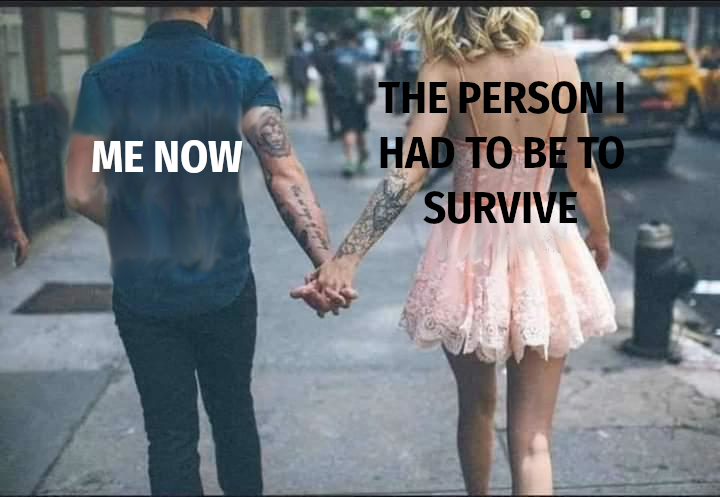10 Declarations vs. 10 Affirmations: How Lisa Shultz's Article Gaslights Gender-Questioning Youth
Countering Invalidating Messages with Facts and Understanding

Countering Invalidating Messages with Facts and Understanding
If you are a gender-questioning youth or adult reading this, I want you to know first and foremost that you are not crazy, what you are experiencing is real and valid, your feelings matter, and support is available. You may have recently come across an article by Lisa Shutlz entitled “A Message to Girls About Their Bodies: Ten Declarations for Girls to Live By”1 that, through some rhetorical questioning, is attempting to gaslight those who are questioning their gender, and spreading misinformation about gender-affirming care. Maybe a parent passed it to you thinking this is going to set everything right, or are a series of very valid questions/concepts to explore. Maybe you stumbled across it on your own, or you are the parent who thinks that not only does Shultz’s article make sense, but you are experiencing the fallout with your kid after sharing it with them and are wondering why things are the way they are now. Let's set the record straight with facts and compassion.
While Shultz’s article expresses concern for girls' well-being, nearly all of the messages they are sending are invalidating and potentially harmful for people AFAB who are questioning their gender identity or experiencing gender dysphoria. The entire article is, essentially, a gaslighting and misinformation effort. These people need to be supported in exploring their identities without shame or pressure in either direction. To be clear, this does not mean they are trans and/or that they will choose to transition, though that is a strong likelihood. Regardless if they are trans or not, they deserve access to compassionate, evidence-based care to help them live full, authentic lives.
With that said, let’s visit Shultz’s “Ten Declarations for Girls to Live By” and review them with an evidence-based care approach that respects and listens to trans people’s experiences. I shall start with a copy of Shultz’s ten declarations, and then add my own words under each one:
If you feel distress, know that your body is not the problem. Hiding, binding, or removing your breasts will not solve your distress.
Except: If you feel significant distress because of your body, so much so that you hide and bind your breasts, and wish you were never born with breasts or as a female, and if and binding your breasts gives some relief, then this is likely something called gender dysphoria. While not everyone with gender dysphoria is transgender, these persistent feelings are a strong sign that you might be transgender.
Remember: If you are experiencing distress about your body not aligning with your gender identity, that is a very real and understandable feeling. Exploring those feelings, with the support of a qualified gender therapist, is a healthy and important step. Anyone who dismisses your distress or insists your body isn't the problem is ignoring your lived experience. Trying to ignore or repress these feelings will not resolve them and can seriously impact your mental health. Your distress is real, you are not wrong or crazy, and you deserve support in processing it in a healthy way.
Logical Fallacy: Appeal to emotion and false dilemma fallacies. Tries to evoke an emotional response about distress rather than making a logical argument. Implies the only options are accepting your body as is or taking misguided steps to change it, ignoring that for some transgender people, taking steps like these, can relieve distress.
Do not believe that taking drugs and cross-sex hormones will make you better or more authentic than you are right now. There is no need to pretend to be someone else; you are good enough and lovable just as you are. Be brave and be yourself.
Unless: taking hormones and pursuing gender-affirming care is what allows you to finally be your true, authentic self. For many transgender people, this care is lifesaving - it's not about "pretending," but becoming who they've always been. If you've always felt like you were putting on an act, if you know who and what you are on the inside yet you feel distress that you and the world cannot see it on the outside, then you should live and be true to yourself. Do not pretend to be what everyone expects you to be! If all you want is for who and what you really are to shine through so that you and all the world can see it and recognize you for who you really are, then you might be transgender.
Remember: Be brave and be yourself is great advice! That means having the courage to live openly and authentically as the gender you know yourself to be, despite the discrimination you may face. Taking hormones or having surgery is not about 'pretending to be someone else.' It's about aligning their body with their innate identity so they can be seen authentically by themselves and the world. And you are absolutely good enough and lovable, right now and always. You deserve support in becoming your bravest, truest, best self.
Logical Fallacy: Strawman fallacy. Misrepresents the reasons why transgender people pursue medical transition, painting it as "pretending to be someone else" rather than living as their authentic selves. Employs loaded language like "drugs" and "cross-sex hormones" to evoke an emotional response.
You were born in the right body. Learn to be friends with your body. Do not turn against your body; it is your ally and needs your protection.
Unless your body feels like a prison, and you find yourself at war with it every day, wishing more than anything that it matched who you know yourself to be - how you wish the world saw the real you. In that case, pursuing gender-affirming care is not an act of betrayal, but of deep love and protection - it's honoring your whole person, body and mind, by bringing them into congruence as best as you can. If the idea of living in a body that is free from this pain or distress, one that feels like home, like a cherished friend and ally, fills your heart with peace, then you might be transgender.
Remember: You are you, and that is truer than true. Nobody is more you-er than you. This means that nobody knows you and what you are experiencing better than you do. If you find that you love your body, except for that unfortunate sex/gender problem, know that is ok. Do not turn against your body or your life - this is the only meat sack you get! Be kind to it. Learn to love it, and if that requires modification to ease the pain, then so be it. If you feel persistent distress, or if you would like nothing more than to have this one set of sex attributes to be different/another, you might be transgender.And you deserve access to the care that will let your body reflect the beautiful person you've always been.
Logical Fallacy: Begging the question fallacy. Assumes as true the claim it is trying to argue - that everyone is born in the "right body." For transgender people this is perceived as false, and often stated as such as a relatable metaphor. Contains loaded language suggesting the body is "tampered with" by gender-affirming care, while ignoring the fact that most everyone tampers with their body in some way, and far more cis people than trans people do so in a “gender-affirming” way.
Your natural body and health will not work well if tampered with. Treat your body with care and respect. Good health is priceless, so guard your body and preserve your health.
Unless your body and gender identity are misaligned, causing you deep distress - in which case, gender-affirming medical care is safe, effective and lifesaving. Pursuing this care to help your body reflect your true self is not "tampering," but a courageous act of self-love in the face of immense barriers and discrimination. If the idea of living authentically in a body that aligns with your gender identity fills you with hope and excitement, then you might be transgender.
Remember: People tamper with their body all the time, from the cup of coffee or tea, to corrective surgeries for all manner of injuries, illness, or happenstance of birth, and even for cosmetic reasons - simply because they think it looks nice. In any event, when it comes to choosing to tackle this particular set of challenges you are faced with, it is very important that you do so with prudence and care. This is not any different than any thing else cisgender people do to themselves. The issue is not so much that they dislike gender-affirming care, they just dislike it when trans people do it too. This boils down to their sensibilities being offended, which is not your problem. This is not your problem about your body, this is their problem with you and your body. You unequivocally deserve access to expert care to help you thrive.
Logical Fallacy: Appeal to nature fallacy. Assumes that because something is "natural" it is inherently good, ignoring that medical intervention is often necessary and beneficial, as with gender-affirming care for transgender people who need it.
Do not become chained with dependency on industries or ideologies that wish to control, use, and profit from you for life. Reclaim your own life and autonomy today because in the decades to come, you are likely to regret losing yourself and your natural body to those entities.
Unless embracing your true gender identity and pursuing gender-affirming care is what allows you to reclaim your autonomy and live life on your own terms. Far from losing yourself, being transgender means finding yourself and having the courage to live authentically, despite immense societal pressure to conform. If you dream of thriving in a body and life that reflects your true self, not what others dictate for you, then you might be transgender.
Remember: There is no greater autonomy and reclamation of your life than being true to yourself and living your truth in honesty, openly, and being seen and recognized for who and what you are. In a climate where gender conformation, sexism, and conservatism is winning, simply being who you are is a revolutionary act. Do not compromise your sense of self for the benefit of others, do not let their hate profit from your submission. Reclaim your own life and autonomy today because in the decades to come, you are likely to regret losing yourself and your natural body to those external influences of negativity and hate. You unequivocally deserve access to the care you need to make that dream a reality.
Logical Fallacy: Slippery slope fallacy. Suggests pursuing gender-affirming care will inevitably lead to lifelong dependency and regret without evidence. Ignores the agency of transgender people to make informed decisions about their care, or that many cisgender people voluntarily choose similar paths as matters of convenience, health, or aesthetics.
Strangers and online influencers are not your friends and rarely have your future health and well-being in mind. Do not listen to people who advocate that you should alter or modify your body. You cannot count on them to support you. They will disappear if you don’t follow their ideology, and if you ever question their ideas or pathway, they will strike out against you.
Unless you find a supportive community of transgender peers and allies who understand your journey and have your best interests at heart. They will celebrate your authentic self and stick by you, even if you question or change your path. If you feel seen, accepted and uplifted when connecting with other transgender people, if their stories resonate deep in your soul, then you might be transgender.
Remember: Do not listen to the fearmongering ideologues, do not look to those who deny science, studies, data, and long term outcomes of trans folks. Do not listen to those who would deny you the health care you deserve, or the benefits it will bring you. You cannot count on them to support you, because as soon as you admit to them you really are trans, still, in spite of “desisting” and if you begin to question their ideas, they will shun you and attack you. Keep in mind that when a trans person is forced to enact healthy boundaries for themselves, and/or estranged by their family and friends, it is the LGBTQIA+ communities that pull together and help them land on their feet, as best as we are able. You deserve to be part of a loving community that will support you no matter what, and fight passionately against those who would discriminate against you.
Logical Fallacy: Hasty generalization fallacy. Makes a sweeping claim about "strangers and online influencers" without considering the support many transgender people receive from their communities. Ignores the advocacy of major medical organizations.
Becoming a woman, and possibly a mother, is a great honor. Do not betray or abandon your unique femininity and sisterhood with other women. Embrace it with your own style and personality as you move toward this special opportunity to shine bright, gay or straight, as a powerful woman.
Unless the idea of being seen and treated as a woman for the rest of your life fills you with dread and despair. For transgender men, abandoning the costume of femininity is not a betrayal, but a homecoming - an embrace of the man you've always been. If sisterhood has always felt like a farce, and the dream of joining the brotherhood of men sets your soul on fire, then you might be transgender.
Remember: Do not betray your sense of self, do not compromise yourself or your values, principles, and autonomy. If you find that being pregnant, embracing your own style and personality within the confines of femininity and sisterhood, is not a life that seems right or a good fit for you, if no amount of embracing it in every way you can conceive of has ever made it felt right to you, then you might be transgender. And you have every right to shine bright as your most authentic, powerful self - even if others perceive that as an act of rebellion.
Logical Fallacy: False dilemma fallacy. Presents being a woman and mother as incompatible with being transgender, when many transgender men can bear children. Ignores diverse transgender experiences and identities.
Do not give away your power to others who are promoting radical ideas and barely know you. You and your body deserve better.
Unless you find the strength within yourself to reclaim your power and autonomy, and refuse to let others dictate who you are or how you should live. The only "radical idea" is the belief that transgender people don't have the right to make decisions about their own bodies and lives. If you know in your heart that living authentically as your true gender is the only way forward, despite the discrimination you may face, then you might be transgender.
Remember: This is why you should not listen to TERFs online. This is why you should not listen to anyone online, really (including me!). Go find people who share experiences like you are having now, and find people to talk to who can help you. If you find yourself really feeling seen and understood, and resonate with, the experiences of trans people, you might be transgender. Go seek a qualified mental health professional with experience in helping LGBTQIA+ clients/patients, and talk it out - don’t listen to internet keyboard experts - particularly ones who are spreading fear, prejudice, hate, and misinformation.
Logical Fallacy: Ad hominem fallacy. Attacks the character of gender-affirming care supporters by calling their ideas "radical" without addressing the substance of the ideas. Attempts to undermine transgender people's agency.
Hone your critical thinking skills and adaptive coping strategies for long-term resilience, sound mental health, and success in life.
No Exceptions: honing your critical thinking is very important, and will help you cement the fact that you know yourself best, and that your lived experience of your gender is more valid than what others tell you it should be. Developing adaptive coping strategies is vital, but for transgender people, access to gender-affirming care is often an essential part of building the resilience and sound mental health needed to thrive in the face of discrimination. If your vision of success in life is to live authentically as your true self, and that so happens to be as a man, even when society pushes you to conform, then you might be transgender.
Remember: This is great advice no matter who you are and where you come from. Put the science and data first, go where it leads you, and when an argument seems too good to be true, read up on it and research it. Do not fall into the pit of ideological beliefs or movements, and question everything - read and research that which you question until you understand it. Learn, and think for yourself. Need help? Find a support group for trans people, and attend one. Ask questions, learn from their lived experiences. Read the studies, learn to understand that science behind it, and form your own conclusions. This is how you inoculate yourself against indoctrination. Do not fall prey to ideologues from either side of the aisle. That bodily autonomy we talked about earlier? That is only beneficial if you have an autonomous mind to go with it.
Logical Fallacy: Red herring fallacy. While critical thinking and coping skills are important for everyone, mentioning them distracts from the real issue that gender-affirming care is medically necessary for many transgender people.
Do not turn your back on your family, especially your mother, grandmother, and the female mentors and matriarchs who came before you. Treat your heritage with respect. Let your ancestors be proud of you.
Unless living authentically as the person you've always been is the greatest way to honor your true heritage and make your ancestors proud. For transgender people, embracing their identity is not an act of betrayal or disrespect - it's a homecoming, a return to self. If you dream of the day your family sees the real you, and celebrates you for exactly who you are, then you might be transgender.
Remember: While family support can make all the difference, your identity is valid whether they accept it immediately or not. You may need to be patient as they adjust, and set boundaries to protect your wellbeing, but don't let fear of their reaction keep you from living your truth. Many trans people maintain close family bonds, and often find their relationships improve when they can finally be authentic with their loved ones. At the end of the day, the ancestors are surely proudest of those with the strength to live honestly, even in the face of adversity. You deserve a family that loves and takes pride in the real you. Sadly, that is not always your birth family, but your family of choice.
Logical Fallacy: Appeal to tradition fallacy. Assumes traditional family structures and gender roles should be upheld simply because they are traditional. Ignores the harm caused to transgender (and cisgender!) people by expecting them to conform to an identity that is not theirs.
Lisa Shultz's "Ten Declarations for Girls to Live By" is rife with misinformation and logical fallacies that invalidate the very real experiences of gender-questioning youth and adults. Her article attempts to gaslight those who may be transgender, dismissing their distress as a "problem" with their thinking rather than a sign that their gender identity may not align with their body.
To any readers questioning their gender - your feelings are valid. You are not alone, crazy, or wrong. What you are experiencing is real, and you deserve support in exploring your identity without shame or external pressure. Pursuing gender-affirming care, should you choose that path, is a courageous act of self-love, not an act of self-betrayal. You have the right to make informed decisions about your body and your life.
Help and support are available. Look for communities and professionals who will celebrate you and validate your experiences. You deserve to shine brightly as your most authentic self, even if others don't understand. At the end of the day, you are the expert on your own identity. Don't let anyone take that away from you.
Resources:
Trans Lifeline: https://translifeline.org/
The Trevor Project: https://www.thetrevorproject.org/
PFLAG: https://pflag.org/
How to Find a Gender Therapist:
I hope this article has helped counter some of the harmful misconceptions and misinformation put forth by Mrs. Shultz. To all the brave, beautiful questioning, transgender and gender-expansive readers out there - you are seen, you are valid, and you are loved. Keep shining. You've got this!
Shultz, L. (2024, November 18). A message to girls about their bodies. Substack. Retrieved November 18, 2024, from https://thetranstrain.substack.com/p/a-message-to-girls-about-their-bodies ↩


